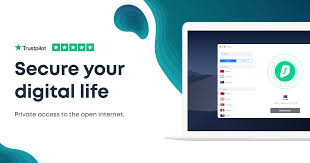
Surfshark
Most of us connect to the internet through our ISPs (Internet Service Providers). When you do that, your data travels through a network of routers to reach its destination. Usually, it’s completely unencrypted (i.e. plain text). Even if it has some encryption, some information remains visible – like your IP. It’s needed to communicate with the internet with no issues. On top of that, your ISP can easily see what you’re up to online… and worse, so can anyone who monitors your connection. This includes the websites you browse and the files you download.
When using a VPN, a secure “tunnel” is created between the provider and the end-user (that’s you!). VPNs operate on the same lines everyone else uses on the internet. There is an important distinction: the data is scrambled to create a private connection. Your information travels back and forth privately via this encrypted “tunnel”. Using this encrypted “tunnel,” information travels back and forth between the user and the VPN provider. If somebody tried to decrypt it, they would have to have an access key. Without it, that’s essentially impossible!.

Why would I want to use a VPN?
.jpg)
The era we live in is one of connectivity. While it has many advantages, it unfortunately also has a lot of risks. There’s a growing number of cyber-threats and generally a lot of unsolicited attention in our lives. Not all of it is malicious. For example, advertisers may want to collect your private information for marketing reasons. But they do compromise your privacy, and that’s something many people value – and a lot more should. If you want to be more private online, or don’t want anyone to spy on you, using a VPN is an easy – and simple – choice to make.
VPNs also provide other nifty benefits. For example, you can access content that’s not available in your country. You can also protect yourself on public WiFi, and even get better prices when you shop for airline tickets! There are quite a few more use cases, and you can find all of them here.


